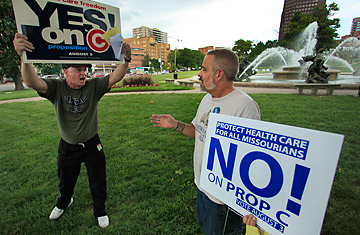
Proposition C opponent Mark Matzeder, right, debates with Proposition C supporter Trevor Hanso during a rally in Kansas City, Mo., on July 29, 2010
Missouri voters go to the polls Tuesday for the first-in-the-nation referendum on President Obama's health care plan. It is likely to give Republicans a chance to brag about the unpopularity of Obamacare, but the vote will be largely symbolic. Courts will eventually decide whether Missouri and other states can legally trump federal law and exempt citizens from the mandate to buy insurance. But sending a signal to Washington will be victory enough for the Republicans and Tea Party activists pushing Proposition C.
"You don't need to worry about the courts when the people are trying to have their say," says Lloyd Smith, executive director of the Missouri GOP. "The people are saying this is going too far. It's a referendum on the overreach of the Obama Administration and the liberals in Congress." The vote is as much about "anger and frustration" at all things Washington as it is about health care, explains Representative John Diehl, a Republican from St. Louis County who was one of the chief proponents of the referendum when it passed the Missouri legislature.
But the specific issue boils down to this: Can the government require that citizens buy health insurance? Mandatory insurance is a key element of the health care reforms passed by congressional Democrats and signed by Obama this year. Adding healthy people to the insurance pool spreads the cost of policies for people with health problems. Missouri's referendum rejects that mandate by asking voters whether state laws should be amended to forbid penalties for failing to have health insurance.
Opponents of Prop C — those who support the insurance mandate — have been frustrated by the lack of a vigorous campaign to defeat it. Apart from a mass mailing by the Missouri Hospital Association, no organized effort existed until a few weeks ago when three 19-year-olds started a Facebook campaign. "I've had to spend about $500 out of my own pocket making signs," lamented Caleb-Michael Files, the Subway sandwich-shop manager and full-time college student who launched the Facebook effort. He wonders why Missouri is spending money on a referendum likely to stir up an expensive court case. "The law is the law," he says. Missouri lieutenant governor Peter Kinder is one of several state officials across the country who have already filed suit challenging the federal law. (Another of those, Virginia attorney general Ken Cuccinelli, gained a small victory in his fight against the law on Monday when a federal judge ruled that the state does indeed have standing to bring the suit.)
Prop C is a gimme for the GOP base. In polls, Republicans strongly oppose Obamacare — and Tuesday's primaries are far more interesting on the GOP side, practically guaranteeing a turnout heavily skewed against health care reform. Republicans barely need to raise more money to get out the vote.
"I'm embarrassed as a Missourian that [Proposition C is] even on the ballot," says state senator Jolie Justus, a Kansas City Democrat who is tired of arguments about federal powers and state rights. "I was under the impression we resolved the issue of the supremacy clause and states' rights with the Civil War." Democrats in the Missouri legislature had consciously maneuvered Prop C onto the August ballot. The argument was that it would be better to hold the referendum this month than let it become a rallying point for the GOP in November, when retiring Senator Christopher "Kit" Bond's seat is up for grabs.
But by burying the issue in the dog days of August, Democrats are giving the President's critics a chance to trumpet the outcome as the first true test of Obama's signature initiative. Other states have similar opt-outs on the November ballot. Some states simply enacted laws without a referendum. But this is the first time voters will actually speak on the divisive issue.
Justus said she is disappointed that Obama supporters couldn't muster a bigger effort to defeat Prop C. But Democrats have good reason to fear the issue — even into November. When most bellwether states were tipping into Obama's column in 2008, Missouri narrowly voted against him — and his star has dropped steadily since then. The Democratic candidate for Bond's seat in the U.S. Senate — Missouri secretary of state Robin Carnahan — is getting drubbed in TV ads by her likely Republican foe, U.S. Representative Roy Blunt, for being a "rubber stamp" on issues like health care.
Under such pressure, Carnahan reluctantly issued a lukewarm statement on Prop C through a spokesman — forced to touch the issue almost at "point-blank range," as one Republican cackled. The statement by spokesman Linden Zakula was cryptic: "If the issue is approved by the voters, there is some question about what would be the practical implication since it would be an issue of state law pre-empting federal law. But when it comes to this issue in general, as a breast-cancer survivor [Carnahan] takes the issue of health care very personally, and thinks it makes a lot more sense to fix the things that still need fixing instead of repealing the entire bill, or opting out, and going back to insurance companies making out like bandits and denying coverage for people with pre-existing conditions."
Missouri has a rich history, though, of waving political flags. The Show-Me State likes to show the rest of the country just what it thinks of outside meddling. Six years ago, in another August primary, Missouri seized the chance to be the first state to ban gay marriage after Massachusetts allowed it. Now it may well make a similarly controversial statement about how it does things differently from the people back east.
